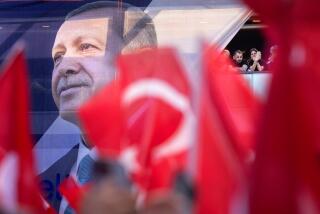An ally needs us
- Share via
The “Kurdish problem” used to be a Turkish problem, a Syrian problem, an Iranian problem and an Iraqi problem. The U.S. invasion of Iraq has turned it into an American problem -- and lately, a very vexing one.
Failure to quell Kurdish terrorism could end 50 years of strong relations between the United States and Turkey. The country matters a great deal because it is the only genuine Islamic democracy in the Middle East, the only Muslim country in NATO, a key ally in Afghanistan and an essential transit route into Iraq. It’s also very angry at the United States -- and was so even before the House Foreign Affairs Committee approved a bill condemning Turkey for the World War I-era Armenian genocide. It’s probably impossible for Washington to give Ankara what it wants, but this would be a good time to give Turkey something.
It’s true that the Turkish parliament refused to allow U.S. troops to pass though its territory to invade Iraq. It’s true that the Turks -- once the warmest of allies -- now give poll responses showing them to be the most anti-American population in the Middle East. And it’s true that Turkey’s historic repression of the Kurds has made matters infinitely worse, as has its refusal to negotiate with terrorists, which thwarts political solutions.
Nevertheless, Turkey has a legitimate grievance. Rebels from the Kurdistan Workers Party, or PKK, whom the U.S. State Department has labeled terrorists, have stepped up attacks on Turkey from their sanctuaries in northern Iraq, and the Turks are furious that the U.S. military claims to be helpless to stop them. President Bush promised Prime Minister Recep Tayyip Erdogan in 2004 to do more to stop the PKK inside Iraqi Kurdistan. But in the last month alone, PKK fighters have killed at least 25 Turkish soldiers and 12 civilians. Ankara can be forgiven for complaining that Bush’s demand for nations to be “either with us or against us” in the war on terror is not reciprocated.
So when the Turkish parliament last week authorized the use of military force in Iraq, U.S. officials did not deny its right to do so. They merely prayed aloud that Ankara would decide it’s not in Turkey’s best interest to invade. But Turkish patience with unkept American promises is understandably running out.
Gen. David H. Petraeus, the U.S. commander in Iraq, has reportedly opposed diverting American troops “surging” in Iraq to a probably fruitless campaign to roust PKK guerrillas who have been dug in for decades among a supportive population in some of the Middle East’s most rugged territory. But the United States could at the very least pressure Kurdish leaders to clean up their backyards -- or spare a few U.S. Special Forces troops for a “snatch and grab” operation to capture top PKK commanders.
Would the passive Kurdish authorities be more willing to act against the PKK if they learned that the U.S. and Turkey were planning a joint NATO operation against the sanctuaries? Washington should find out.
More to Read
Sign up for Essential California
The most important California stories and recommendations in your inbox every morning.
You may occasionally receive promotional content from the Los Angeles Times.









